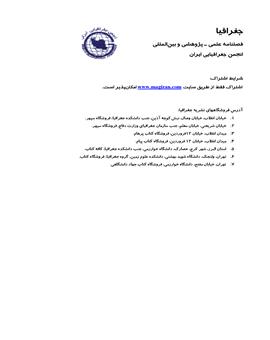Community-based tourism development with an emphasis on aspects of local ethnic; Case Study of Kermanshah
Subject Areas :
1 -
2 -
Keywords: community-based tourism, ethnic tourism, cultural tourism, the city of Kermanshah,
Abstract :
The process of globalization through the creation of cultural assimilation attempts to expand markets for the production of similar goods in the form of scales. In practice, the pressure to eliminate ethnic subcultures past few years has led to resistance that indicates intense desire to create dependency cultures, ethnic identity to avoid elimination. Iran is the most obvious examples of cultural diversity, ethnic, linguistic and religious in the world that, unlike most multi-ethnic countries, local ethnic diversity or cultural mosaic of indigenous and native of the area. Kermanshah city with so much power development, with strong ethnic community can be the background of ethnic tourism markets. Kurdish ethnicity is cross-border continuity that can be regional in scope commodification (tourism, media, etc.). The issue of how ethnic powers to achieve the objectives of social development at the local, regional and national benefit is important. Methods applied research - development and data collecting field and library. Urban population of 40 managers and 340 are tourists. Overall, most respondent's ethnic profiles of influential cultural ethnic tourism development in the city of Kermanshah in poor and middle-assessed. Chi-square test results in the desired quantity survey in evaluating community-based tourism development with an emphasis on local ethnic aspect is significant in Kermanshah. Since the amount of (sig) or smaller than the significance level corresponding to that test is (
1. پاپلی یزدی، محمدحسین (1385)، گردشگری، ماهیت و مفاهیم، تهران، سمت؛
2. حسینی، سیدفرهاد، احمدی، پرویز، خداداد حسینی، سیدحسین (1389)، بررسی تأثیرگذاری توسعه گردشگری قومی بر موضوعات اجتماعی فرهنگی جامعه مورد پژوهی روستاهای هدف گردشگری استان کرمانشاه، مجله مدیریت شهری، شماره 26، پاییز و زمستان 89؛
3. خليلياردكاني، محمدعلي؛ معيدفر، سعيد؛ ساعي، علي (1392)، جهاني شدن و تاثير آن بر هويت قومي و ملي: مطالعه كردهاي سنندج، نشريه مسائل اجتماعي ايران، سال چهارم، شماره 1؛
4. الطایی، علی (1382)، بحران هویت قومی در ایران، چاپ دوم، تهران، نشر شادگان؛
5. فراهاني، فاطمه؛ گرجي، ابوالفضل صياميان (1393)، عشاير قشقايي: فرصتي براي توسعه گردشگري هنري- عشايري ايران، فصلنامه پژوهش هنر، سال دوم، شماره 8؛
6. فكوهي، ناصر (1385)، فرهنگ ملي، فرهنگهاي قومي - جماعتي و بازار اقتصاد صنعتي، مجله جامعه¬شناسي ايران، سال هفتم، شماره 1 (پياپي 13)؛
7. فكوهي، ناصر؛ نصرتي، روح¬اله (1390)، مطالعه جامعه¬شناختي- انسان¬شناختي فرهنگ قومي – جماعتي برخي از مناطق آذري نشين ايران و نقش آن در توسعه اقتصادي – فرهنگي، دو فصلنامه مطالعات جامعه¬شناختي، سال هجدهم، شماره 39؛
8. قرخلو، مهدی (1386)، جغرافیای جهانگردی و برنامه¬ریزی اوقات فراغت، تهران، انتشارات جهاد دانشگاهی.
9. کاظمی، مهدی (1385)، مدیریت گردشگری، تهران، سمت؛
10. كروبي، مهدي (1387)، فرهنگ قومي، سرمايه فرهنگي و صنعت گردشگري، فصلنامه رفاه اجتماعي، سال هفتم، شماره 28؛
11. مقصودی، مجتبی؛ ارسیا، بابک (1388)، جایگاه گردشگری در تعیین همبستگی ملی در ایران، فصلنامه مطالعات ملی، سال دهم، شماره 1؛
12. نواح، عبدالرضا؛ قیصری، نورالله؛ تقوی¬نسب، سیدمجتبی (1389)، آسیب¬شناس مسایل قومی در ایران (مطالعه موردی عربهای ساکن شهرستان اهواز)، فصلنامه تحقیقات فرهنگی، دوره سوم، شماره سوم، صص 71-47؛
13. Chen, Zh., Li, L., (2016), The organizational evolution, systematic construction and empowerment of Langde Miao's community tourism, Tourism Management, Available online 7 April 2016;
14. Deery, M., Jago, L., Fredline, L., (2012), Rethinking social impacts of tourism research: A new research agenda, Tourism Management, Volume 33, Issue 1, Pages 64–73;
15. Harng, L., Minca, C., (2014), Touring responsibility: The troubl e with ‘going local’ in community-based tourism in Thailand, Geoforum, Volume 51, Pages 96–106;
16. Ishi, K., (2012), The impact of ethnic tourism on hill tribes in Thailand, Annals of Tourism Research, Volume 39, Issue 1, Pages 290–310;
17. Jamison, D. (1999), Tourism and ethnicity: the borthrhood of coconuts. Annals of tourism reserch, 26(4), 944-967;
18. Lee, T., (2013), Influence analysis of community resident support for sustainable tourism development, Tourism Management, Volume 34, Pages 37–46;
19. Li, P., Ryan, Ch., Cave, J., (2016), Chinese rural tourism development: Transition in the case of Qiyunshan, Anhui. – 2008–2015, Tourism Management, Volume 55, Pages 240–260;
20. Maruyama, N., Woosnam, K., (2015), Residents' ethnic attitudes and support for ethnic neighborhood tourism: The case of a Brazilian town in Japan, Tourism Management, Volume 50, Pages 225–237;
21. Safarabadi, A., Varesi, H.R., Zangiabadi, A., (2014), Urban Tourism Spaces Management; with an Emphasis on Historical Attractions of Isfahan, Journal of Applied Environmental and Biological Sciences, Vol. 4, No. 2, PP. 31-38;
22. Valeriu Vana, M., Malaescu, S., (2016), Cultural Thematic Tourism Itineraries: Mediators of Success, Procedia Economics and Finance, Volume 39, Pages 642–652;
23. Wu, B., (2015), Planning for Ethnic Tourism, Annals of Tourism Research, Volume 52, Pages 180–181;
24. Yang, J., Ryan, Ch., Zhang, L., (2013), Author VitaeSocial conflict in communities impacted by tourism, Tourism Management, Volume 35, Pages 82–93;
25. Yang, J., Ryan, Ch., Zhang, L., (2013), Ethnic minority tourism in China – Han perspectives of Tuva figures in a landscape, Tourism Management, Volume 36, Pages 45–56;
26. Yang, J., Ryan, Ch., Zhang, L., (2016), Impersonation in ethnic tourism – The presentation of culture by other ethnic groups, Annals of Tourism Research, Volume 56, Pages 16–31;
27. Yang, J., Ryan, Ch., Zhang, L., (2016), Impersonation in ethnic tourism – The presentation of culture by other ethnic groups, Annals of Tourism Research, Volume 56, Pages 16–31;
28. Yang, L., Wall, G., (2009), Ethnic tourism: A framework and an application, Tourism Management, Volume 30, Issue 4, Pages 559–570;
29. Yang, L., (2011), Ethnic tourism and cultural representation, Annals of Tourism Research, Volume 38, Issue 2, Pages 561–585;
30. Yang, L., Wall, G., Smith, S., (2008), Ethnic tourism development: Chinese Government Perspectives, Annals of Tourism Research, Volume 35, Issue 3, Pages 751–771.


